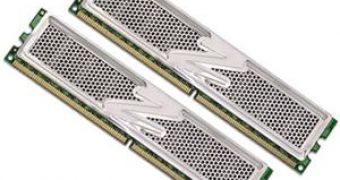Random access memory modules are currently operating at pretty high frequencies and in some cases, they reach even the 1.8Ghz mark. DDR3 compliant memory modules are the fastest ones around right now but the biggest central processing manufacturing company in the world, Intel, is not content with the current speeds and it is working with JEDEC in order to bring to market memories that pass the 2.0Ghz barrier thanks to the XMP technology.
The extreme memory profile, XMP for short, technology is Intel compatible and it should provide speeds in excess of 1866MHz, reaching up to 2133MHz for the DDR3 compliant memory modules, reports the new site xbitlabs. As the new and speedy memory modules will be only DDR3 compliant, computer users that are having their systems powered by processing units made by Intel's rival, Advanced Micro Devices, will not be able to enjoy the high speeds and facilities offered by the new technology.
We are working on adding a few more speed bins to JEDEC's standard DDR3's definition - specifically like 1866MHz and 2133MHz - even though these speed bins will first be covered by the XMP spec,'' said Christopher Cox, senior staff engineer for Intel's platform memory operations, in an interview and he was cited by the above mentioned site.
Intel plans the new memory modules as accessories for the upcoming high performance desktop aimed mainboard chipset X48 as it will officially offer support for DDR3 compliant random access memory modules running at 1600MHz, even if some mainboard manufacturing companies like Asus and Gigabyte already claim such support for their product offerings based on the X38 chipset.
While 1800Mhz running memory modules are not officially supported by the Intel X48 chipset, using the XMP technology users could lower their latency timings and rise their running frequencies in order to get a big performance boost from the memory sub-system. From the technical perspective, making DDR3 memory modules that can run at clock speeds higher than 2.0GHz is not very difficult, but in order to come up with a unified JEDEC standard manufacturing, companies will have to agree on a set of speeds, most probably 2133MHz or PC3-17000.
Even as the operating speeds of the newest memory modules are raising higher and higher, a series of test between DDR2 and DDR3 compliant modules running at 1200MHz and 1600MHz show only a tiny amount of performance gain and so the boost in performance may be revealed only when truly high memory speeds are becoming the norm and not the exception.

 14 DAY TRIAL //
14 DAY TRIAL //